| Listing 1 - 9 of 9 |
Sort by
|
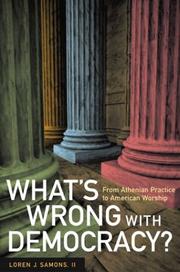
ISBN: 1282360310 9786612360312 0520940903 1598750011 9780520940901 0520236602 9780520236608 9781598750010 141754533X 9781417545339 9781282360310 6612360313 Year: 2004 Publisher: Berkeley University of California Press
Abstract | Keywords | Export | Availability | Bookmark
 Loading...
Loading...Choose an application
- Reference Manager
- EndNote
- RefWorks (Direct export to RefWorks)
Fifth-century Athens is praised as the cradle of democracy and sometimes treated as a potential model for modern political theory or practice. In this daring reassessment of classical Athenian democracy and its significance for the United States today, Loren J. Samons provides ample justification for our founding fathers' distrust of democracy, a form of government they scorned precisely because of their familiarity with classical Athens. How Americans have come to embrace "democracy" in its modern form-and what the positive and negative effects have been-is an important story for all contemporary citizens. Confronting head-on many of the beliefs we hold dear but seldom question, Samons examines Athens's history in the fifth and fourth centuries B.C. in order to test the popular idea that majority rule leads to good government. Challenging many basic assumptions about the character and success of Athenian democracy, What's Wrong with Democracy? offers fascinating and accessible discussions of topics including the dangers of the popular vote, Athens's acquisitive foreign policy, the tendency of the state to overspend, the place of religion in Athenian society, and more. Sure to generate controversy, Samons's bold and iconoclastic book finds that democracy has begun to function like an unacknowledged religion in our culture, immune from criticism and dissent, and he asks that we remember the Athenian example and begin to question our uncritical worship of democratic values such as freedom, choice, and diversity.
Political culture --- Representative government and representation --- Republicanism --- Direct democracy --- Democracy --- Direct legislation --- Referendum --- History. --- United States --- Civilization --- Greek influences. --- american government. --- ancient greece. --- athenian democracy. --- athenian government. --- athenian society. --- choice. --- classical athenian democracy. --- democracy. --- democratic governments. --- dissent. --- diversity. --- elections. --- foreign policy. --- freedom. --- government and governing. --- government and religion. --- government. --- historical. --- history. --- national defense. --- peloponnesian war. --- political systems. --- political theory. --- politics. --- popular vote. --- public finance. --- qualifications for citizenship. --- religion. --- united states of america. --- voting.

ISBN: 0520225546 9780520225541 0520925769 1281752428 9786611752422 1429440090 052093217X 1433700018 Year: 2007 Publisher: Berkeley : University of California Press,
Abstract | Keywords | Export | Availability | Bookmark
 Loading...
Loading...Choose an application
- Reference Manager
- EndNote
- RefWorks (Direct export to RefWorks)
This book presents a state-of-the-art debate about the origins of Athenian democracy by five eminent scholars. The result is a stimulating, critical exploration and interpretation of the extant evidence on this intriguing and important topic. The authors address such questions as: Why was democracy first realized in ancient Greece? Was democracy "invented" or did it evolve over a long period of time? What were the conditions for democracy, the social and political foundations that made this development possible? And what factors turned the possibility of democracy into necessity and reality? The authors first examine the conditions in early Greek society that encouraged equality and "people's power." They then scrutinize, in their social and political contexts, three crucial points in the evolution of democracy: the reforms connected with the names of Solon, Cleisthenes, and Ephialtes in the early and late sixth and mid-fifth century. Finally, an ancient historian and a political scientist review the arguments presented in the previous chapters and add their own perspectives, asking what lessons we can draw today from the ancient democratic experience. Designed for a general readership as well as students and scholars, the book intends to provoke discussion by presenting side by side the evidence and arguments that support various explanations of the origins of democracy, thus enabling readers to join in the debate and draw their own conclusions.
Cosmology --- Eternity --- Infinite --- Future life --- Cosmology - Early works to 1800 --- Eternity - Early works to 1800 --- Democracy --- History --- Greece --- Athens (Greece) --- Politics and government --- Politics and government. --- academic. --- ancient greece. --- ancient historian. --- ancient history. --- ancient world. --- athenian democracy. --- athens. --- cleisthenes. --- cultural history. --- cultural studies. --- easy to understand. --- ephialtes. --- greek culture. --- greek democracy. --- greek government. --- greek history. --- philosophical. --- political philosophy. --- political science. --- political scientist. --- political. --- politics. --- scholarly. --- social change. --- social history. --- social studies. --- solon.
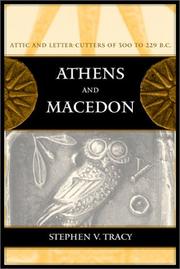
ISBN: 1282759086 9786612759086 0520928547 1597344761 9780520928541 1417525789 9781417525782 0520233336 9780520233331 Year: 2003 Publisher: Berkeley University of California Press
Abstract | Keywords | Export | Availability | Bookmark
 Loading...
Loading...Choose an application
- Reference Manager
- EndNote
- RefWorks (Direct export to RefWorks)
Little of the historiography of third-century Athens survives, and much of what we know-or might know-about the period has come down to us in inscriptions carved by Attic stonemasons of the time. In this book Stephen Tracy, the world's preeminent expert in this area, provides new insight into an unsettled and obscure moment in antiquity.
Attic Greek dialect --- Stone-cutters --- Inscriptions, Greek --- Greek language --- Greek inscriptions --- Greek philology --- Granite cutters --- Marble cutters --- Stone industry and trade --- Writing. --- History. --- Macedonia --- Athens (Greece) --- Inscriptions, Greek -- Greece -- Attike.. --- Stone-cutters -- Greece -- Attike -- History.. --- Attic Greek dialect -- Writing.. --- Athens (Greece) -- History.. --- Macedonia -- History. --- agora xvi. --- ancient greece. --- antiquity. --- archaeology. --- archon. --- archonship. --- aristion. --- athenian democracy. --- athens. --- attic decrees. --- attic letter cutters. --- attica. --- chaironeia. --- chremonidean war. --- classical studies. --- cutter of agora. --- demetrios. --- democracy. --- demosthenes. --- diomedon. --- eleusis. --- ephebes. --- eurykleides. --- government. --- greek history. --- hellenism. --- history. --- kings. --- macedon. --- macedonia. --- marble. --- nonfiction. --- occupation. --- oligarchy. --- olympiodoros. --- phaleron. --- politics. --- ptolemy. --- regime. --- sortition. --- stonemasons. --- writing.
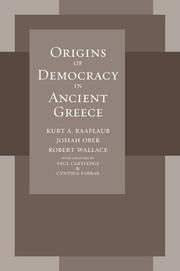
ISBN: 0520925769 1281752428 9786611752422 1429440090 052093217X 1433700018 9780520932173 9781281752420 9781429440097 9780520245624 0520245628 Year: 2007 Publisher: Berkeley University of California Press
Abstract | Keywords | Export | Availability | Bookmark
 Loading...
Loading...Choose an application
- Reference Manager
- EndNote
- RefWorks (Direct export to RefWorks)
This book presents a state-of-the-art debate about the origins of Athenian democracy by five eminent scholars. The result is a stimulating, critical exploration and interpretation of the extant evidence on this intriguing and important topic. The authors address such questions as: Why was democracy first realized in ancient Greece? Was democracy "invented" or did it evolve over a long period of time? What were the conditions for democracy, the social and political foundations that made this development possible? And what factors turned the possibility of democracy into necessity and reality? The authors first examine the conditions in early Greek society that encouraged equality and "people's power." They then scrutinize, in their social and political contexts, three crucial points in the evolution of democracy: the reforms connected with the names of Solon, Cleisthenes, and Ephialtes in the early and late sixth and mid-fifth century. Finally, an ancient historian and a political scientist review the arguments presented in the previous chapters and add their own perspectives, asking what lessons we can draw today from the ancient democratic experience. Designed for a general readership as well as students and scholars, the book intends to provoke discussion by presenting side by side the evidence and arguments that support various explanations of the origins of democracy, thus enabling readers to join in the debate and draw their own conclusions.
Democracy --- Self-government --- Political science --- Equality --- Representative government and representation --- Republics --- History --- Athens (Greece) --- Greece --- Politics and government. --- Politics and government --- Democracy -- Greece -- History -- To 1500.. --- Democracy -- Greece -- Athens -- History -- To 1500.. --- Greece -- Politics and government -- To 146 B.C.. --- Athens (Greece) -- Politics and government. --- academic. --- ancient greece. --- ancient historian. --- ancient history. --- ancient world. --- athenian democracy. --- athens. --- cleisthenes. --- cultural history. --- cultural studies. --- easy to understand. --- ephialtes. --- greek culture. --- greek democracy. --- greek government. --- greek history. --- philosophical. --- political philosophy. --- political science. --- political scientist. --- political. --- politics. --- scholarly. --- social change. --- social history. --- social studies. --- solon.
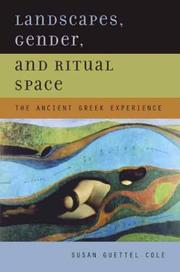
ISBN: 0520929322 9786612356933 1282356933 1597346993 9780520929326 9781597346993 141754502X 9781417545025 0520235444 9780520235441 9781282356931 Year: 2004 Publisher: Berkeley, Calif. University of California Press
Abstract | Keywords | Export | Availability | Bookmark
 Loading...
Loading...Choose an application
- Reference Manager
- EndNote
- RefWorks (Direct export to RefWorks)
The division of land and consolidation of territory that created the Greek polis also divided sacred from productive space, sharpened distinctions between purity and pollution, and created a ritual system premised on gender difference. Regional sanctuaries ameliorated competition between city-states, publicized the results of competitive rituals for males, and encouraged judicial alternatives to violence. Female ritual efforts, focused on reproduction and the health of the family, are less visible, but, as this provocative study shows, no less significant. Taking a fresh look at the epigraphical evidence for Greek ritual practice in the context of recent studies of landscape and political organization, Susan Guettel Cole illuminates the profoundly gendered nature of Greek cult practice and explains the connections between female rituals and the integrity of the community. In a rich integration of ancient sources and current theory, Cole brings together the complex evidence for Greek ritual practice. She discusses relevant medical and philosophical theories about the female body; considers Greek ideas about purity, pollution, and ritual purification; and examines the cult of Artemis in detail. Her nuanced study demonstrates the social contribution of women's rituals to the sustenance of the polis and the identity of its people.
Sacred space --- Women --- Holy places --- Places, Sacred --- Sacred places --- Sacred sites --- Sacred spaces --- Sites, Sacred --- Space, Sacred --- Holy, The --- Religion and geography --- Human females --- Wimmin --- Woman --- Womon --- Womyn --- Females --- Human beings --- Femininity --- History. --- Religious life --- Artemis --- Αρτεμις --- أرتميس --- Ārtimīs --- Artemisa --- Artemida --- Артэміда --- Артемида --- Artemiso --- 아르테미스 --- Arŭt'emisŭ --- Artemide --- ארטמיס --- Artemi --- Artemisz --- アルテミス --- Артеміда --- 阿耳忒弥斯 --- A'ertemisi --- Diana --- Cult. --- Greece --- Religious life and customs. --- Artemis (Greek deity) --- Religion. --- Women -- Religious life -- Greece -- History.. --- Sacred space -- Greece -- History.. --- Artemis (Greek deity) -- Cult.. --- Greece -- Religion. --- ancient history. --- ancient law. --- anthropology. --- antiquity. --- arete. --- artemis. --- athenian democracy. --- city states. --- community. --- competition. --- family. --- female body. --- feminism. --- fertility. --- folk religion. --- folklore. --- gender difference. --- gender roles. --- gender. --- greece. --- greek ritual. --- greeks. --- hubris. --- law. --- legal system. --- masculinity. --- mythology. --- nonfiction. --- polic. --- pollution. --- purity. --- religion. --- reproduction. --- rite. --- ritual. --- sacred space. --- sexuality. --- social body. --- tradition. --- violence. --- women. --- womens rituals.

ISBN: 0520909682 0585139806 9780520909687 9780585139807 0520054261 9780520054264 0520067983 9780520067981 Year: 1986 Publisher: Berkeley University of California Press
Abstract | Keywords | Export | Availability | Bookmark
 Loading...
Loading...Choose an application
- Reference Manager
- EndNote
- RefWorks (Direct export to RefWorks)
Analyzing the "democratic" features and institutions of the Athenian democracy in the fifth century B.C., Martin Ostwald traces their development from Solon's judicial reforms to the flowering of popular sovereignty, when the people assumed the right both to enact all legislation and to hold magistrates accountable for implementing what had been enacted.
Law, Greek. --- Law --- Constitutional history --- Rule of law --- Democracy. --- Supremacy of law --- Administrative law --- Constitutional law --- Self-government --- Political science --- Equality --- Representative government and representation --- Republics --- Acts, Legislative --- Enactments, Legislative --- Laws (Statutes) --- Legislative acts --- Legislative enactments --- Jurisprudence --- Legislation --- Greek law --- Law, Ancient --- History. --- Athens (Greece) --- Politics and government. --- Law, Greek --- Law - Greece - Athens - History --- Constitutional history - Greece - Athens - To 146 B.C --- Rule of law - Greece - Athens --- Democracy --- Athens (Greece) - Politics and government --- accountability. --- administration of justice. --- ancestral law. --- ancient greece. --- ancient greek history. --- antigone. --- assembly. --- athenian democracy. --- athens. --- cleisthenes. --- constitutional law. --- courts. --- democracy. --- democratic. --- ephialtes. --- fifth century bc. --- government control. --- governments and governing. --- internal policy. --- judicial reform. --- jury courts. --- law. --- legal history. --- legal. --- legislation. --- magistrates. --- polarization. --- politics. --- popular sovereignty. --- religion. --- religious norms. --- scrutiny. --- social norms. --- social order. --- social thought. --- society. --- solon. --- sophocles. --- Rule of law.
Book
ISBN: 1282645048 9786612645044 1400835062 0691128561 0691163421 9780691163420 9781400835065 9781282645042 9780691128566 Year: 2010 Publisher: Princeton, NJ
Abstract | Keywords | Export | Availability | Bookmark
 Loading...
Loading...Choose an application
- Reference Manager
- EndNote
- RefWorks (Direct export to RefWorks)
In recent years, most political theorists have agreed that shame shouldn't play any role in democratic politics because it threatens the mutual respect necessary for participation and deliberation. But Christina Tarnopolsky argues that not every kind of shame hurts democracy. In fact, she makes a powerful case that there is a form of shame essential to any critical, moderate, and self-reflexive democratic practice. Through a careful study of Plato's Gorgias, Tarnopolsky shows that contemporary conceptions of shame are far too narrow. For Plato, three kinds of shame and shaming practices were possible in democracies, and only one of these is similar to the form condemned by contemporary thinkers. Following Plato, Tarnopolsky develops an account of a different kind of shame, which she calls "respectful shame." This practice involves the painful but beneficial shaming of one's fellow citizens as part of the ongoing process of collective deliberation. And, as Tarnopolsky argues, this type of shame is just as important to contemporary democracy as it was to its ancient form. Tarnopolsky also challenges the view that the Gorgias inaugurates the problematic oppositions between emotion and reason, and rhetoric and philosophy. Instead, she shows that, for Plato, rationality and emotion belong together, and she argues that political science and democratic theory are impoverished when they relegate the study of emotions such as shame to other disciplines.
Democracy - Philosophy. --- Democracy -- Philosophy. --- Plato. --- Plato. Gorgias. --- Shame - Political aspects. --- Shame -- Political aspects. --- Shame --- Democracy --- Philosophy --- Philosophy & Religion --- Political aspects --- Political aspects. --- Philosophy. --- Emotions --- Guilt --- Ad hominem. --- Allan Bloom. --- Ambiguity. --- Ambivalence. --- Anger. --- Aristotle. --- Athenian Democracy. --- Bernard Williams. --- Callicles. --- Catamite. --- Charmides (dialogue). --- Child abuse. --- Civility. --- Conflation. --- Controversy. --- Criticism. --- Critique. --- Crito. --- Deliberation. --- Demagogue. --- Dialectic. --- Dichotomy. --- Direction of fit. --- Disgust. --- Disposition. --- Distrust. --- Elitism. --- Embarrassment. --- False-consensus effect. --- Forensic rhetoric. --- Form of life (philosophy). --- Freedom of speech. --- Gorgias (dialogue). --- Gorgias. --- Grandiosity. --- Gregory Vlastos. --- Hannah Arendt. --- Hedonism. --- Hippias Major. --- Human Rights Watch. --- Humiliation. --- Ideology. --- Inference. --- Irony. --- Jon Elster. --- McGill University. --- Morality. --- Multitude. --- Myth. --- Nicomachean Ethics. --- Omnipotence. --- On the Soul. --- Ostracism. --- Pathos. --- Perversion. --- Phaedo. --- Phaedrus (dialogue). --- Phenomenon. --- Philosopher. --- Pity. --- Pleonexia. --- Political philosophy. --- Politics. --- Polus. --- Prejudice. --- Princeton University Press. --- Protagoras. --- Psychoanalysis. --- Psychotherapy. --- Public sphere. --- Pythagoreanism. --- Rationality. --- Reason. --- Reintegrative shaming. --- Republic (Plato). --- Result. --- Rhetoric. --- Self-criticism. --- Self-deception. --- Self-esteem. --- Self-image. --- Shame. --- Social stigma. --- Socratic (Community). --- Socratic method. --- Socratic. --- Sophism. --- Sophist. --- Suffering. --- Suggestion. --- Symposium (Plato). --- The Philosopher. --- Theory. --- Thought. --- Thrasymachus. --- Uncertainty. --- Vlastos. --- Vulnerability.
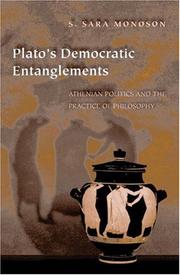
ISBN: 0691043663 0691158584 9786612767128 1400823749 1282767127 1400812720 9781400812721 9781282767126 9781400823741 9780691043661 1400805473 Year: 2000 Publisher: Princeton, N.J. Princeton University Press
Abstract | Keywords | Export | Availability | Bookmark
 Loading...
Loading...Choose an application
- Reference Manager
- EndNote
- RefWorks (Direct export to RefWorks)
In this book, Sara Monoson challenges the longstanding and widely held view that Plato is a virulent opponent of all things democratic. She does not, however, offer in its place the equally mistaken idea that he is somehow a partisan of democracy. Instead, she argues that we should attend more closely to Plato's suggestion that democracy is horrifying and exciting, and she seeks to explain why he found it morally and politically intriguing. Monoson focuses on Plato's engagement with democracy as he knew it: a cluster of cultural practices that reach into private and public life, as well as a set of governing institutions. She proposes that while Plato charts tensions between the claims of democratic legitimacy and philosophical truth, he also exhibits a striking attraction to four practices central to Athenian democratic politics: intense antityrantism, frank speaking, public funeral oratory, and theater-going. By juxtaposing detailed examination of these aspects of Athenian democracy with analysis of the figurative language, dramatic structure, and arguments of the dialogues, she shows that Plato systematically links democratic ideals and activities to philosophic labor. Monoson finds that Plato's political thought exposes intimate connections between Athenian democratic politics and the practice of philosophy. Situating Plato's political thought in the context of the Athenian democratic imaginary, Monoson develops a new, textured way of thinking of the relationship between Plato's thought and the politics of his city.
Democracy --- History --- Plato --- Views on democracy --- -Self-government --- Political science --- Equality --- Representative government and representation --- Republics --- -Aflāṭūn --- Aplaton --- Bolatu --- Platon, --- Platonas --- Platone --- Po-la-tʻu --- Pʻŭllatʻo --- Pʻŭllatʻon --- Pʻuratʻon --- Πλάτων --- אפלטון --- פלאטא --- פלאטאן --- פלאטו --- أفلاطون --- 柏拉圖 --- 플라톤 --- History. --- Views on democracy. --- Self-government --- Aflāṭūn --- Plato. --- Platon --- Platoon --- Платон --- プラトン --- Democracy - Greece - Athens - History --- Plato - Views on democracy --- Aeschylus. --- Against Timarchus. --- Allan Bloom. --- Allegory of the Cave. --- Allusion. --- Ancient Greece. --- Aristotle. --- Athenian Democracy. --- Bribery. --- Callicles. --- Cambridge University Press. --- Citizenship. --- Classical Athens. --- Constitution of the Athenians. --- Critias (dialogue). --- Critias. --- Criticism of democracy. --- Criticism. --- Critique. --- Deliberation. --- Democracy. --- Democratic ideals. --- Demosthenes. --- Ethics. --- Ethos. --- Euripides. --- Exclusion. --- Explanation. --- Fifth-century Athens. --- Funeral oration (ancient Greece). --- Glaucon. --- Gorgias (dialogue). --- Gorgias. --- Greatness. --- Greek tragedy. --- Harmodius and Aristogeiton (sculpture). --- Harmodius and Aristogeiton. --- Herodotus. --- Idealization. --- Ideology. --- Imagery. --- Institution. --- Isocrates. --- Isonomia. --- Josiah Ober. --- Literature. --- Martha Nussbaum. --- Masculinity. --- Menexenus (dialogue). --- Metaphor. --- Metic. --- Multitude. --- Narrative. --- Oligarchy. --- One Hundred Years of Homosexuality. --- Oxford University Press. --- Parrhesia. --- Pederasty in ancient Greece. --- Pericles' Funeral Oration. --- Pericles. --- Phaedrus (dialogue). --- Philosopher. --- Philosophy. --- Pierre Vidal-Naquet. --- Platonic Academy. --- Political dissent. --- Political philosophy. --- Political science. --- Politics. --- Princeton University Press. --- Protagoras. --- Reason. --- Republic (Plato). --- Rhetoric. --- SAGE Publications. --- Self-image. --- Sheldon Wolin. --- Slavery. --- Socratic dialogue. --- Socratic. --- Sophist. --- Sophistication. --- Suggestion. --- The Erotic. --- The Other Hand. --- The Philosopher. --- Theatre of Dionysus. --- Themistocles. --- Theory. --- Thomas Pangle. --- Thought. --- Thucydides. --- Tragedy. --- Tyrannicide. --- Tyrant. --- Voting. --- Wealth. --- Writing. --- Yale University Press.
Book
ISBN: 9780691241944 Year: 2022 Publisher: Princeton, NJ
Abstract | Keywords | Export | Availability | Bookmark
 Loading...
Loading...Choose an application
- Reference Manager
- EndNote
- RefWorks (Direct export to RefWorks)
In a major revisionary approach to ancient Greek culture, Sarah Morris invokes as a paradigm the myths surrounding Daidalos to describe the profound influence of the Near East on Greece's artistic and literary origins.
Art, Greek. --- Arts --- Greek art --- Art, Aegean --- Classical antiquities --- Art, Greco-Bactrian --- History. --- Daedalus --- Δαίδαλος --- Daidalos --- Taitale --- Dédalo --- Dédale --- Acropolis. --- Aeschylus. --- Ancient Greece. --- Ancient Greek art. --- Ancient Greek comedy. --- Ancient Greek sculpture. --- Ancient Greek temple. --- Anecdote. --- Archaeology. --- Archaic Greece. --- Athenian Democracy. --- Barbarian. --- Baruch Spinoza. --- Battle of Salamis. --- Classical Athens. --- Classical Greece. --- Classical archaeology. --- Classical mythology. --- Colonies in antiquity. --- Copernican Revolution (metaphor). --- Crete. --- Criticism of religion. --- Critique. --- Culture of Greece. --- Cumae. --- Daedalus. --- Deus. --- Erechtheus. --- Etruscan civilization. --- Euripides. --- Explanation. --- Fifth-century Athens. --- First principle. --- Funeral oration (ancient Greece). --- Greco-Persian Wars. --- Greek Philosophy. --- Greek Ship. --- Greek literature. --- Greek mythology. --- Greek name. --- Greek tragedy. --- Greeks. --- Hellenistic-era warships. --- Hephaestus. --- Hermeneutics. --- Herodotus. --- Hesiod. --- Histories (Herodotus). --- Immanence. --- Ionians. --- Iphigenia in Aulis. --- Law court (ancient Athens). --- Literature. --- Lykourgos (king). --- Maimonides. --- Marrano. --- Materialism. --- Medism. --- Mycenae. --- Naval warfare. --- Northern Greece. --- Odysseus. --- Oedipus the King. --- Pantheism. --- Peloponnesian War. --- Persian people. --- Philo of Byblos. --- Philoctetes. --- Philosopher. --- Philosophical analysis. --- Philosophy. --- Phoenicia. --- Phoenician alphabet. --- Phrygians. --- Plutarch. --- Poetry. --- Politics. --- Reality. --- Reason. --- Religio. --- Religion. --- Sanchuniathon. --- Scientific revolution. --- Scythia. --- Sensibility. --- Sola scriptura. --- Sophocles. --- Teleology. --- Temple of Artemis. --- Temple of Olympian Zeus, Athens. --- Terracotta. --- The Persians. --- Theatre of ancient Greece. --- Thebes, Greece. --- Themistocles. --- Theology. --- Thessaly. --- Vitruvius. --- Western Greece. --- Writing.
| Listing 1 - 9 of 9 |
Sort by
|

 Search
Search Feedback
Feedback About UniCat
About UniCat  Help
Help News
News